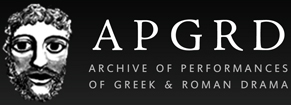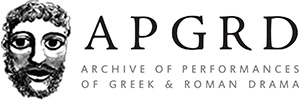The foundations
The APGRD was founded by Edith Hall and Oliver Taplin in 1996, with the help of a three-year grant from the Leverhulme Trust, in response to modern theatre's growing fascination with ancient plays. The APGRD's original purpose was to document the history of the performances of the ancient plays from the Renaissance to the present day - on the stage, on radio and on film - and to begin to understand why particular plays have had special resonances at particular historical moments. During two subsequent five-year AHRC grants and with the broadening of its team of researchers, the APGRD extended its remit both back in time to include the performance history of the ancient plays in antiquity and across genres to include opera and dance within the orbit of modern performance.
2010 onwards
In January 2010, the APGRD embarked upon a new phase in its development with the assistance of both The Andrew W. Mellon Foundation and the Faculty of Classics at the University of Oxford. One major new strand of research is the Leverhulme-funded project on the performance of ancient epic, which emerged from previous research into opera and dance, for which the Homeric and Virgilian epic traditions in particular have proved such a rich treasure trove. The second major research strand relates to translation; and APGRD members are working, with the assistance of The Andrew W. Mellon Foundation and the University of Oxford’s John Fell Fund, towards developing a database of all translations of ancient drama in the major European vernaculars. This focus on the history of translation is complemented by both the APGRD’s longstanding involvement with those engaged in contemporary translation and its regular lecture and seminar series, which features contributions from prominent translators.
Researchers at the APGRD have always worked closely with contemporary practitioners, and from 2005-2010 its Onassis Programme for the Performance of Greek Drama at Oxford commissioned and produced over eighteen new works by international theatre artists inspired by classical Greek drama. The APGRD regularly hosts rehearsed readings of new translations and adaptations and organises workshops for students to enable them to work with leading international theatre practitioners. In 2010, it was awarded a two-year AHRC grant to develop a training programme in public engagement for research students from 12 different universities. The programme, entitled ‘Communicating Ancient Greece and Rome’, builds on these connections with experts working in allied fields beyond the academic world.
Beginning with a modest collection of theatrical memorabilia, the APGRD now includes a substantial library of works relating to theatre history, classical scholarship and intellectual history in particular, CDs and DVDs, production files containing programmes, photographs and reviews, as well as original manuscripts, rehearsal scripts, set designs and oral histories. There is also an online database with details of over 9,000 productions based on ancient drama and epic.
For a brief history of the APGRD collection in the context of museums, archives and collecting more generally, see Fiona Macintosh's chapter (PDF) in The Cambridge Companion to Theatre History (Cambridge, 2012), eds. D. Wiles and C. Dymkowski.


